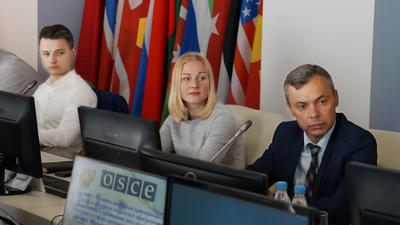-
Our work
-
Fields of work
- Arms control
- Border management
- Combating trafficking in human beings
- Conflict prevention and resolution
- Countering terrorism
- Cyber/ICT Security
- Democratization
- Economic activities
- Education
- Elections
- Environmental activities
- Gender equality
- Good governance
- Human rights
- Media freedom and development
- Migration
- National minority issues
- Policing
- Reform and co-operation in the security sector
- Roma and Sinti
- Rule of law
- Tolerance and non-discrimination
- Youth
- Field operations
- Projects
-
Meetings and conferences
- Summit meetings
- Review Conferences
- Ministerial Council meetings
- Plenary meetings of the Permanent Council
- Plenary Meetings of the Forum for Security Co-operation
- Security Review Conferences
- Annual Implementation Assessment Meetings
- Economic and Environmental Forum
- Economic and Environmental Dimension Implementation Meetings
- Human rights meetings
- Media conferences
- Cyber/ICT security conferences
- Conference of the Alliance against Trafficking in Persons
- Gender equality conferences
- Annual OSCE Mediterranean conferences
- Annual OSCE Asian conferences
- Partnerships
-
Fields of work
-
Countries
- All
-
Participating States
- Albania
- Andorra
- Armenia
- Austria
- Azerbaijan
- Belgium
- Belarus
- Bosnia and Herzegovina
- Bulgaria
- Canada
- Croatia
- Cyprus
- Czechia
- Denmark
- Estonia
- Finland
- France
- Georgia
- Germany
- Greece
- Holy See
- Hungary
- Iceland
- Ireland
- Italy
- Kazakhstan
- Kyrgyzstan
- Latvia
- Liechtenstein
- Lithuania
- Luxembourg
- Malta
- Moldova
- Monaco
- Mongolia
- Montenegro
- The Netherlands
- North Macedonia
- Norway
- Poland
- Portugal
- Romania
- Russian Federation
- San Marino
- Serbia
- Slovakia
- Slovenia
- Spain
- Sweden
- Switzerland – OSCE Chairpersonship 2026
- Tajikistan
- Türkiye
- Turkmenistan
- Ukraine
- United Kingdom
- United States of America
- Uzbekistan
- Asian Partners for Co-operation
- Mediterranean Partners for Co-operation
-
Structures and institutions
- Chairpersonship
-
Secretariat
- Secretary General
- Office of the Secretary General
- Conflict Prevention Centre
- Transnational Threats Department
- Office of the Special Representative and Co-ordinator for Combating Trafficking in Human Beings
- Office of the Co-ordinator of OSCE Economic and Environmental Activities
- Gender Issues Programme
- Opportunities for Youth
- Department of Human Resources
- Department of Management and Finance
- Office of Internal Oversight
- Documentation Centre in Prague
- Institutions
-
Field operations
- Presence in Albania
- Centre in Ashgabat
- Programme Office in Astana
- Programme Office in Bishkek
- Mission to Bosnia and Herzegovina
- Programme Office in Dushanbe
- Mission in Kosovo
- Mission to Moldova
- Mission to Montenegro
- Mission to Serbia
- Mission to Skopje
- Project Co-ordinator in Uzbekistan
- Closed field activities
- Parliamentary Assembly
- Court of Conciliation and Arbitration
- Organizational structure
- About us
News Item
OSCE promotes co-operation among Eastern European law enforcement agencies in digital forensics and network investigations in combating drug-related and other crimes
Some 20 representatives of law enforcement agencies from Belarus and the Russian Federation began an OSCE Secretariat-organized five-day training course, from 4 to 9 June 2018 in Minsk, on developing co-operation among law enforcement agencies in digital forensics and network investigations in combating drug-related and other crimes...

- Issued on:
- Issued by:
- OSCE Secretariat
- Fields of work:
- Policing
Some 20 representatives of law enforcement agencies from Belarus and the Russian Federation began an OSCE Secretariat-organized five-day training course, from 4 to 9 June 2018 in Minsk, on developing co-operation among law enforcement agencies in digital forensics and network investigations in combating drug-related and other crimes.
The course aims at introducing police investigators to the basics of digital forensics and to train them in using open source digital forensics software to identify, analyse, obtain and preserve relevant digital evidence and use it for prosecuting drug-related and other crimes.
“Digital forensics and open sources investigations are gaining importance as the Internet and its resources are more and more used for criminal activities, including for trafficking in illicit drugs and psychotropic substances,” said Andrey Saladovnikov, Deputy Head of the Main Directorate for Drug Control and Combating Trafficking in Human Beings of the Criminal Police of Belarus. “Law enforcement agencies should focus their activities on tackling these modern challenges and continue gaining experience, building up capacities and exchange best practices with other countries in this domain.”
The course is organized by the Strategic Police Matters Unit (SPMU) and the Co-ordination Cell of the OSCE Transnational Threat Department with the support of Belarus’ Interior Ministry.
Rasa Ostrauskaite, the OSCE Secretariat’s Co-ordinator of Activities to Address Transnational Threats, said that in order to more effectively investigate cybercrimes, including those related to Internet use, law enforcement agents need to apply more sophisticated techniques and methods, such as digital forensics and open sources investigations.
“OSCE experts, in co-operation with other relevant organizations, are ready to assist national experts in tackling new challenges and threats by promoting best practices and applicable international standards, as well as by facilitating training of personnel and strengthening the capacities of OSCE participating States,” said Ostrauskaite.